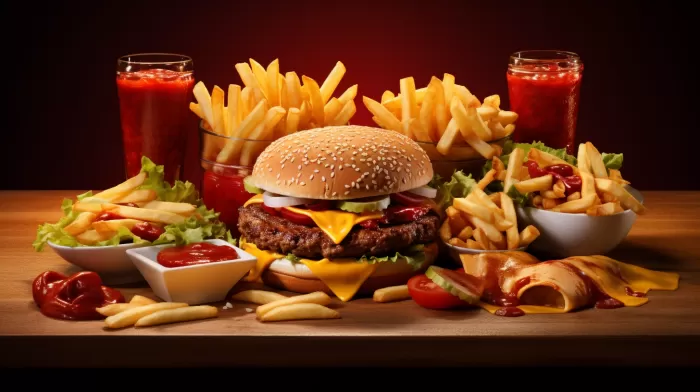Americans are getting heavier, and it seems that they are starving at the same time. How can this be? The issue lies in the fact that, while Americans are consuming more food, they are not getting the necessary nutrients. The typical American diet is full of calorie-dense but nutrient-poor foods, resulting in what is known as “full belly starvation.”
Exploring the Factors Behind Full Belly Starvation
Full belly starvation occurs when we consume large amounts of foods, often high in calories and fat, without providing the essential nutrients our bodies need. The typical American diet consists of:
- An additional 93 calories from salty snacks like potato chips, pretzels, and popcorn
- 49 more calories from soft drinks
- 97 more calories from hamburgers
- 68 more calories from French fries
- 133 more calories from Mexican food, such as burritos, tacos, and enchiladas
What’s worse is that this overeating is not exclusive to dining out – we’ve also developed the habit of eating bigger portions at home. According to the Centers for Disease Control and Prevention, 34.9% of US adults are obese, which equates to 78.9 million individuals. Obesity-related diseases, including heart disease, stroke, type 2 diabetes, and certain cancers, are now more prevalent than ever before.
Why Diets and Weight-Loss Pills Often Don’t Work
Many popular diets and weight-loss pills either don’t work effectively or don’t work at all, with some being dangerous to your health and even your life. Extreme calorie restriction, ruling out specific foods or food groups, and crash dieting can all put unnecessary stress on your heart and other organs. Furthermore, many weight-loss pills contain harmful ingredients that can lead to severe side effects.
Instead, the key to losing weight is to be sensible and take a gradual approach. Aim to lose between three-quarters of a pound and two pounds per week, but never more than three pounds. Focusing on proper eating habits and regular exercise is crucial to achieving a healthy weight and maintaining it long-term.
The Nutritarian Diet: A Better Alternative for Weight Loss and Optimal Health
One effective and sustainable approach to improving your eating habits and achieving a healthier weight is the nutritarian diet, as recommended by Dr. Joel Fuhrman. The nutritarian diet emphasizes whole plant foods, which are naturally nutrient-dense and low in calories.
The primary principles of the nutritarian diet include:
- Consuming at least 90% of your daily diet as whole plant foods (fruits, vegetables, whole grains, nuts, and seeds)
- Allocating no more than 20% of your diet to animal products, such as meats and dairy
- Avoiding processed foods, which are often high in unhealthy fats, added sugars, and sodium
Focusing on a mostly plant-based diet provides your body with the essential nutrients it needs to function optimally, while also helping you lose weight and maintain it for the long term.
Tips for Making the Transition to a Nutritarian Diet
If you’re looking to adopt a nutritarian diet, consider the following tips to help you transition smoothly:
- Add variety to your meals: It’s essential to consume a variety of fruits, vegetables, whole grains, nuts, and seeds to provide your body with all the nutrients it needs.
-
Gradually reduce animal product consumption: Start by making a few meals per week plant-based, then gradually increase the number of plant-based meals as you become more comfortable with the diet.
-
Experiment with new recipes: Try out new dishes and experiment with plant-based versions of your favorite meals. You might be pleasantly surprised at how delicious and satisfying these new additions can be!
-
Focus on whole foods: As much as possible, choose whole, unprocessed foods over highly processed food products, which are often devoid of essential nutrients.
-
Watch portion sizes: Even though the nutritarian diet focuses on nutrient-dense, low-calorie foods, it’s still important to be mindful of portion sizes to ensure you’re not overeating.
In summary, full belly starvation is a real issue facing Americans today as they increasingly consume calorie-dense but nutrient-poor foods. Instead of turning to drastic diets or potentially dangerous weight-loss pills, consider adopting the nutritarian diet and focusing on a mostly plant-based, whole-foods approach to eating. By committing to these healthier habits, you’ll provide your body with the essential nutrients it needs while also promoting a healthy weight and reducing your risk of obesity-related diseases.



